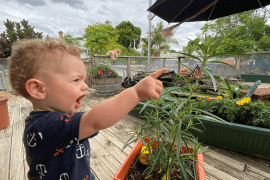Written by Tina Wild, Cerebral Palsy Alliance (CPA), in collaboration with Lou Brown, ADHD Coach, Consultant & Advocate
Being a parent has to be the most rewarding yet toughest job. So, imagine the challenges a parent with Attention Deficit Hyperactivity Disorder (ADHD) faces when their child also has ADHD. At Cerebral Palsy Alliance (CPA) we support and advocate on behalf of babies, children and adults with cerebral palsy and a range of neurological conditions, including ADHD. I spoke to Mum, Lou Brown, to find out how she helps her son thrive with the disorder.
Lou felt like an avalanche had hit when she and her son Jack (now 11) were both diagnosed with ADHD 4 years ago.
“I was 47 and had to come to terms with my own diagnosis, while simultaneously dealing with the devastating guilt and distress I felt from having passed the disorder to my son,” Lou tells me. Over time, however, Lou began to view their diagnoses as a blessing. “It gave me the chance to finally understand myself and get a clinical explanation for Jack’s challenges,” says Lou.
Having lived experience and a clinical background puts Lou in a unique position.
“As a parent, when Jack’s struggling I know how he feels and that it’s not his fault. Criticising or punishing him would only crush his self-esteem and make him oppositional. Patience and empathy are key to supporting a child with ADHD,” says Lou. “As is finding the balance between setting expectations and providing supportive scaffolding.”
As an ADHD advocate, Lou strives to achieve her dream “of a world in which every person with ADHD is understood and supported. Where information and quality treatment are accessible, and those with ADHD thrive, achieve their dreams, and live happy lives.”
The truth about ADHD
ADHD is a complex, neurobiological disorder which is mostly hereditary and results in genetic brain differences. The area most affected is the prefrontal cortex area of the brain, responsible for self-regulation.
ADHD affects the ability to develop self-awareness, regulate attention, behaviour and emotions, recall information, self-motivate, problem-solve, self-reflect and self-soothe.
Hyperactivity, impulsiveness and inattention are classic ADHD symptoms, with many also experiencing emotional regulation challenges.
The mental processes responsible for self-regulation are called executive functions. Children with ADHD lag in developing executive functions by approximately 30%, or 3-6 years, and therefore lack the capacity to control themselves. Additionally, as they mature, the majority of children with ADHD only develop approximately 75-80% of the executive functioning capacity of ‘neurotypical’ adults and, therefore, continue to lag indefinitely.











